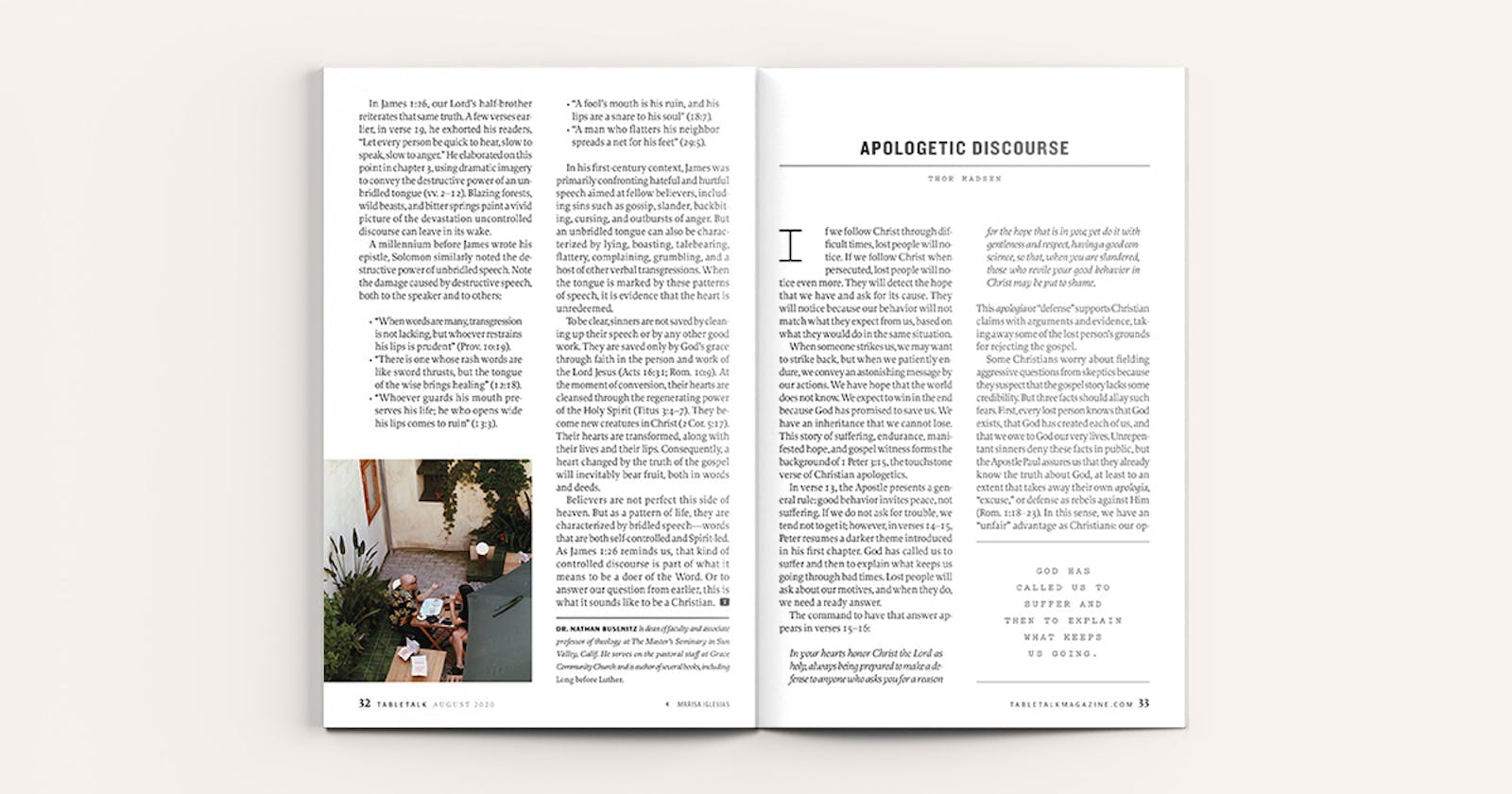
Request your free, three-month trial to Tabletalk magazine. You’ll receive the print issue monthly and gain immediate digital access to decades of archives. This trial is risk-free. No credit card required.
Try Tabletalk NowAlready receive Tabletalk magazine every month?
Verify your email address to gain unlimited access.
If we follow Christ through difficult times, lost people will notice. If we follow Christ when persecuted, lost people will notice even more. They will detect the hope that we have and ask for its cause. They will notice because our behavior will not match what they expect from us, based on what they would do in the same situation.
When someone strikes us, we may want to strike back, but when we patiently endure, we convey an astonishing message by our actions. We have hope that the world does not know. We expect to win in the end because God has promised to save us. We have an inheritance that we cannot lose. This story of suffering, endurance, manifested hope, and gospel witness forms the background of 1 Peter 3:15, the touchstone verse of Christian apologetics.
In verse 13, the Apostle presents a general rule: good behavior invites peace, not suffering. If we do not ask for trouble, we tend not to get it; however, in verses 14–15, Peter resumes a darker theme introduced in his first chapter. God has called us to suffer and then to explain what keeps us going through bad times. Lost people will ask about our motives, and when they do, we need a ready answer.
The command to have that answer appears in verses 15–16:
In your hearts honor Christ the Lord as holy, always being prepared to make a defense to anyone who asks you for a reason for the hope that is in you; yet do it with gentleness and respect, having a good conscience, so that, when you are slandered, those who revile your good behavior in Christ may be put to shame.
This apologia or “defense” supports Christian claims with arguments and evidence, taking away some of the lost person’s grounds for rejecting the gospel.
Some Christians worry about fielding aggressive questions from skeptics because they suspect that the gospel story lacks some credibility. But three facts should allay such fears. First, every lost person knows that God exists, that God has created each of us, and that we owe to God our very lives. Unrepentant sinners deny these facts in public, but the Apostle Paul assures us that they already know the truth about God, at least to an extent that takes away their own apologia, “excuse,” or defense as rebels against Him (Rom. 1:18–23). In this sense, we have an “unfair” advantage as Christians: our opponents already agree with us and must live in denial regarding these basic truths.

Second, no lost person’s belief system can compete with Christianity intellectually, because Christianity answers all of life’s ultimate questions. Where did the universe come from? What makes the universe act in predictable ways that science can measure? Can we trust our minds and senses to inform us about the world around us and about the principles of reason and value? Do objective values exist? How did Jesus get out of the tomb on the third day? Christianity alone answers these questions in a satisfactory way. The alternatives out there tend to ignore these questions or to answer them implausibly.
Third, we should remember that no belief system answers every question we have. Some mysteries will always remain, especially in thoughts concerned with a being such as God. If a lost person asks a question that we cannot answer, we can just admit it. With “gentleness and respect” (1 Peter 3:15), we can say, “I don’t know, at least not yet.” Peter does not command us to pretend otherwise. This freedom depends on the fact that God, not the Christian apologist, saves sinners.
Apologetics must say to the lost person what Augustine heard on the day of his conversion: “Take up and read.” Nothing replaces God’s Word. The lost person must meet the Savior, Jesus Christ. He must see himself as lost now, but he can be found in Christ. In Scripture, we find the words of eternal life for all who believe. Apologetics can serve the preaching of this message but can never replace it. Therefore, let us address complex philosophical theories if we must. But let us always end with the lost person’s own heart and soul.
